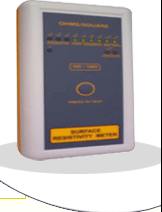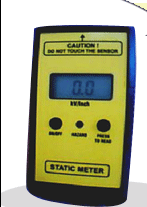To classify the material in Antistatic, Conductive or
Insulator
To optimize the dosage of Antistatic Masterbatches &
Conductive Compounds
To compare the effectiveness of various types of
Antistatic Masterbatches & Conductive Compounds
To find the Surface & Volume Conductivity of various
powder & liquid

Surface resistivity meter
Uses
Specifications
Measurement Range
Measurement Accuracy
Resolution
Repeatability
Open Circuit Voltage
Indication
Test actuation
Power Supply
Calibration
Warranty
Measurement Accuracy
Resolution
Repeatability
Open Circuit Voltage
Indication
Test actuation
Power Supply
Calibration
Warranty
: 103 to 1012 Ohms & Ohms / Sq
: +/- 10%
: ½ Decade
: +/- 10%
: 100 V (+/- 10V)
: Visual by different colour LEDs
: Press to Test switch
: 9 Volts DC Battery
: Calibration recommended once in 12 mths
: 12 months from the Date of Supply
: +/- 10%
: ½ Decade
: +/- 10%
: 100 V (+/- 10V)
: Visual by different colour LEDs
: Press to Test switch
: 9 Volts DC Battery
: Calibration recommended once in 12 mths
: 12 months from the Date of Supply



Static Charge Meter
Specifications
Measurement Range
Measurement Accuracy
Indication
Test actuation
Power Supply
Low Battery
Calibration
Warranty
Measurement Accuracy
Indication
Test actuation
Power Supply
Low Battery
Calibration
Warranty
: +/- 0-10 KV
: +/- 10%
: 2 ½ Digit LCD Display
: Press TO read
: 9 Volt Battery
: Warning at 7.0 Volts
: Recommended every 12 mths
: 12 Months
: +/- 10%
: 2 ½ Digit LCD Display
: Press TO read
: 9 Volt Battery
: Warning at 7.0 Volts
: Recommended every 12 mths
: 12 Months
Uses
To locate the Static Charge present
To finds the intensity of Static Charges
To gets the polarity
To classify material into Antistatic / Insulator
Non contact type easy to operate & has a range of 0-10 KV
During manufacturing of Antistatic / Conductive film, its very
important to know, when exactly the required Antistatic /
Conductive material has come and when to start winding
operation in the roll form
To finds the intensity of Static Charges
To gets the polarity
To classify material into Antistatic / Insulator
Non contact type easy to operate & has a range of 0-10 KV
During manufacturing of Antistatic / Conductive film, its very
important to know, when exactly the required Antistatic /
Conductive material has come and when to start winding
operation in the roll form
All conductive and antistatic materials will not generate static voltage on friction, where as all normal plastic generate 5-10
KV friction. Normal plastic have 1012 Ohms and above, and for antistatic and conductive products their values are much
lowers.Conductive properties are obtained generally by using the conductive compounds, which are ready to us.
KV friction. Normal plastic have 1012 Ohms and above, and for antistatic and conductive products their values are much
lowers.Conductive properties are obtained generally by using the conductive compounds, which are ready to us.